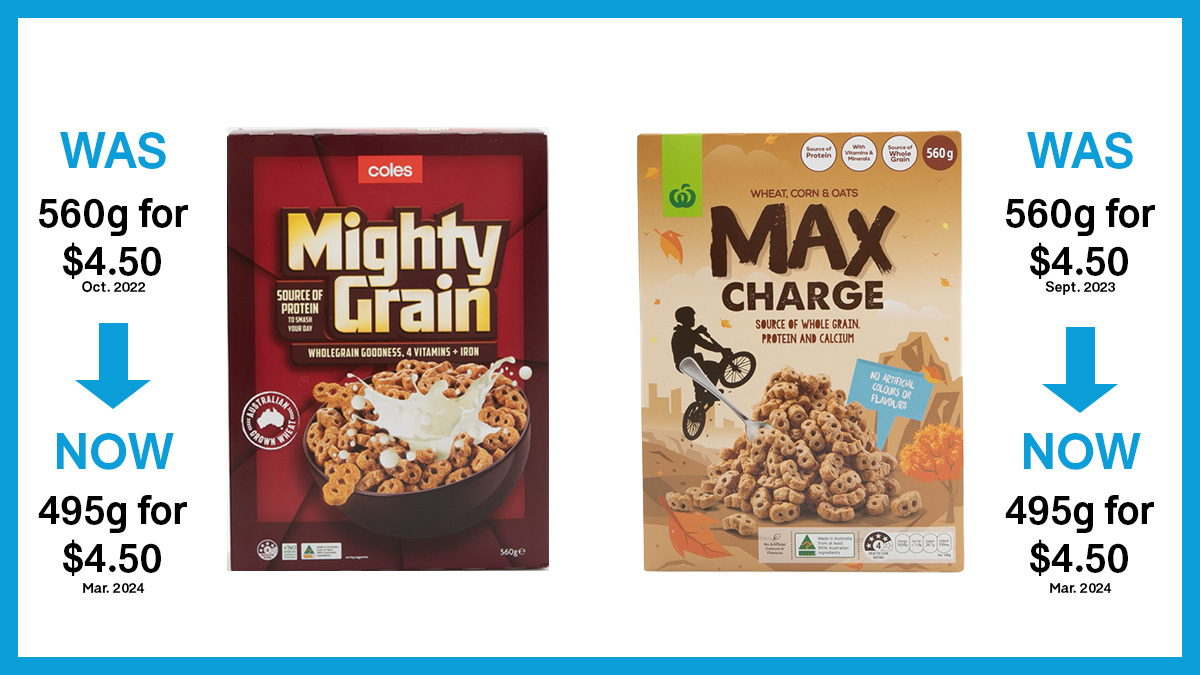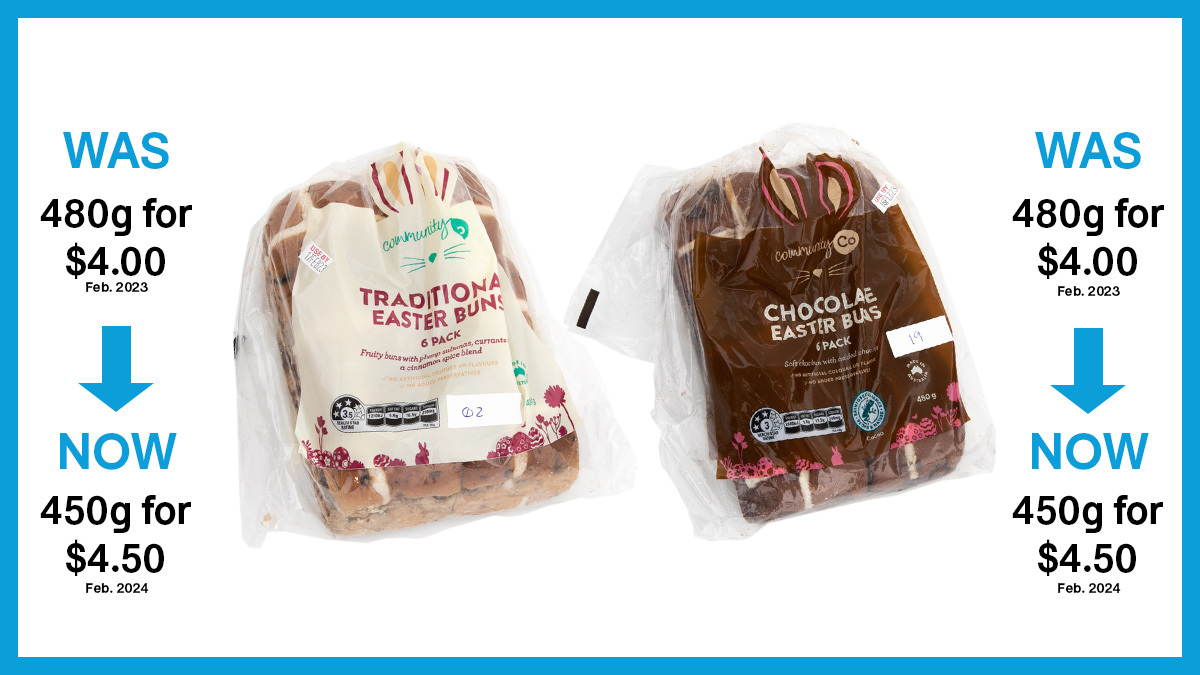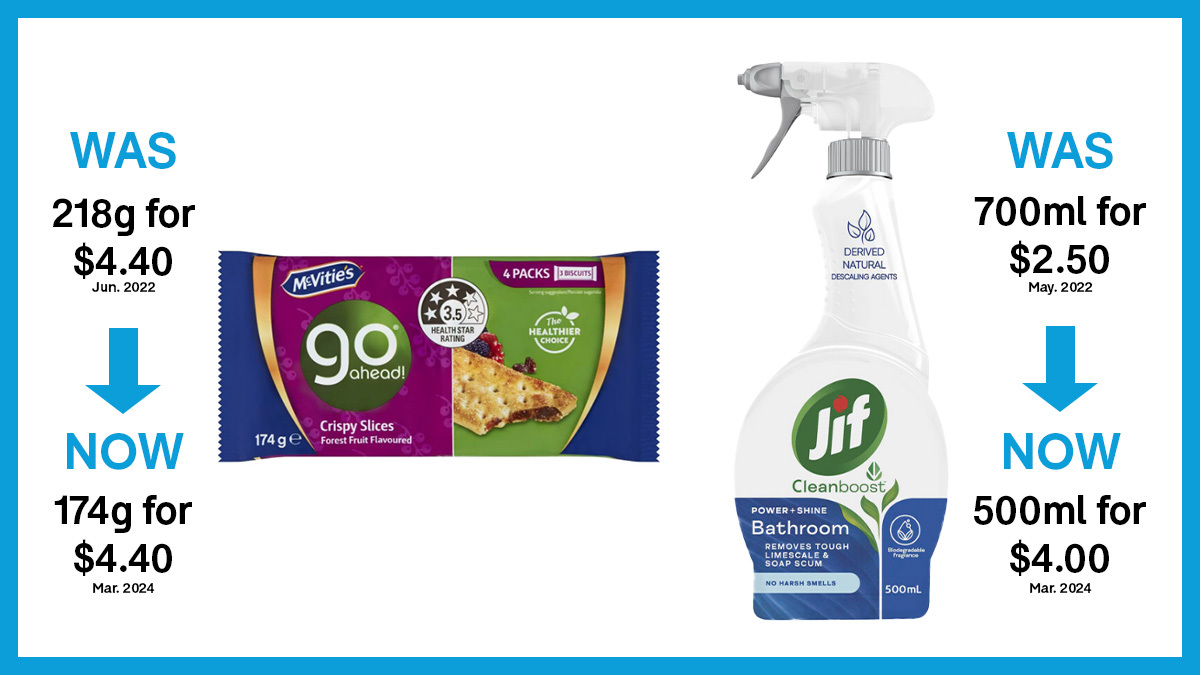Get our independent lab tests, expert reviews and honest advice.
10 grocery items hit by shrinkflation in 2024

Need to know
- Shrinkflation is a hidden form of inflation, where a product gets smaller, but the price stays the same or increases
- We’re calling out products that we’ve noticed have recently been hit by shrinkflation, and ask brands why it’s happening
- CHOICE believes retailers should have to disclose when a product has changed in size and value
On this page:
- What is shrinkflation?
- Revealed: The latest examples of shrinkflation
- Why is shrinkflation happening?
- Is shrinkflation illegal?
UPDATE: CHOICE welcomes the federal government’s announcement on 3 October 2024 that it plans to combat shrinkflation by strengthening the unit pricing code and introducing penalties for breaches of these rules.
Easter favourites, breakfast cereals, chips and cleaning products are among the latest grocery goods to be hit by shrinkflation.
Businesses have admitted to reducing the size of these items, and in some cases hiking retail prices, blaming rising costs and attempts to simplify production.
CHOICE has tips for how you can spot shrinkflation, but we believe retailers owe it to shoppers to be upfront about products that have decreased in size but not in price.
What is shrinkflation?
Shrinkflation is when a manufacturer reduces the size of an item it produces, but doesn’t extend this to the price, meaning consumers end up paying the same amount – or in some cases, even more – for less product.
CHOICE supporters have been tipping us off about shrinkflation consistently over the past two years, calling out times they’ve seen their favourite products getting scrimped on.
“We’ve heard from countless shoppers who are feeling frustrated by the prevalence of shrinkflation in supermarkets,” says CHOICE senior campaigns and policy adviser Bea Sherwood.
People turn up to the shops to find the products they often buy have been reduced in size, and in some cases the price has increased
CHOICE senior campaigns and policy adviser Bea Sherwood
“People turn up to the shops to find the products they often buy have been reduced in size, and in some cases the price has increased.”
This erosion in value for money comes as many Australians continue to grapple with the cost of living.
In our January Consumer Pulse survey of households, two-thirds told us they were either finding it difficult or only getting by on their current income.
Revealed: The latest examples of shrinkflation
Acting on public tip-offs and analysis of our own data, CHOICE has uncovered some of the latest examples of products getting smaller and more expensive.
We’ve also asked the companies responsible for these goods to explain why this is happening.
Cereals lead the (shrinking) pack
This breakfast staple is a serial offender when it comes to shrinkflation, having featured heavily in our previous investigations into shrinking pack sizes.
In our latest probe, we’ve uncovered more examples of shoppers getting poorer value for money in the cereal aisle.
First up is Coles’ Mighty Grain, which was being sold in 560g packets in October 2022, but can now only be found in 495g packages. Yet it remains the same price at $4.50.
The years also haven’t been kind to the supermarket’s own brand of corn flakes, which shrank from 475g in October 2022 to 440g today. Meanwhile, the price went in the opposite direction, increasing 20 cents to $2.10.

Woolworths has also been downsizing home brand breakfast items – its Max Charge cereal was sold in 560g packs until September last year, when the retailer started offering it in 495g portions instead.
In that time, the price has stayed the same at $4.50, meaning what you’ll pay for each 100g of the cereal has increased by almost 14%.
Easter favourite guilty of shrinking sin
In unwelcome news for many of us stocking up ahead of Easter, hot cross buns have also been hit by the latest wave of shrinkflation.
Community Co’s traditional and chocolate varieties have both shrunk by 30g since last year, going from 480g to 450g. They’ve also gone up in price, from $4.00 to $4.50.

Chips and biscuits crumble in value
Chips is another area where we’ve seen shrinkage in the past, and here again we’re noticing home brand offerings getting smaller.
Woolworths’ original salted corn chips were $2.30 for 200g in October 2023. The price may have stayed the same, but you now get just 175g for your trouble.
On top of paying almost 14% more per 100g of corn chips, you might find yourself with less condiment to dip them in.
Red Rock Deli’s range of deli-style dips has also undergone cutbacks, with its 150g tubs shrinking to 135g between December 2021 and the time of writing.
Any sweet tooths hoping their go-to snacks might be a refuge from shrinkflation are also in for disappointment
And any sweet tooths hoping their go-to snacks might be a refuge from shrinkflation are also in for disappointment.
Fans of McVities’ Go Ahead range of “forest fruit”-flavoured biscuits have been getting less munch for their money recently, with the packets going from 218g and retailing for $4.40 in June 2022, to 174g for the same price now.
The brand’s iconic digestive biscuits are also seeing some scrimpage, going from 400g to 355g. The retail price, meanwhile, has remained stuck at $4.40.
Cleaning products providing less spray for pay
It’s not just food products where we’re seeing shrinkage. Your cleaning products are not immune to the downsizing.
If you’re a long-time user of Jif’s Power & Shine Bathroom cleaner, you’ll find yourself getting fewer sprays from the bottle than you used to.
In May 2022, you got 700ml for $2.50. Now, you get 500ml for $4, meaning the cost of each 100ml has increased by over 122%.

Why is shrinkflation happening?
Brands that shrink the sizes of their products consistently tell us it’s in response to rising production costs.
In other words, putting less of a product in a package or making the package itself smaller helps keep a lid on the cost of doing business.
Because shrinkflation can be more difficult to spot than a straightforward increase in retail price, it’s a more subtle way for companies to try to pass these rising costs onto consumers.
Passing the buck
This time around, Coles and Woolworths both told us the changes in the pack sizes of their cereals and chips were requested by the suppliers of these goods.
The supermarkets said they had not profited or benefited financially from these changes and any cost relief was being retained by the suppliers, who were facing rising production costs. CHOICE was not able to reach the suppliers to confirm this.
In a statement, Community Co owner Metcash told us it recently moved the production of its hot cross buns to a different maker and this manufacturer’s capabilities had dictated a reduction in pack size to 450g.
Coles and Woolworths said they had not profited or benefited financially from these changes
The IGA parent company also mentioned higher prices for certain ingredients, along with including more chocolate in its chocolate buns recipe, as reasons for the product’s price hike.
Meanwhile, Red Rock Deli dip maker Obela says the cost of producing these products has gone up “substantially” and this is why they’ve decided to downsize.
Unilever (Jif Power & Shine Bathroom cleaner) didn’t wish to comment, and United Biscuits (McVities) didn’t respond to our queries.
Are Woolworths mud cakes getting smaller?
Shrinkflation accusations have been flying thick and fast on social media recently, after online personalities alleged Woolworths had shrunk its version of the iconic supermarket-brand chocolate mud cake from 600g to 585g.
But Woolworths says this isn’t shrinkflation, rather two differently-sized versions of the same product being available at different stores.
This was confirmed by CHOICE, with Woolworths’ website showing both products simultaneously in stock at different outlets in Sydney.
How to spot shrinkflation
Three ways to know if your favourite products are getting smaller
1. See if you’re getting fewer items when the product promises to come with a set number
2. Keep an eye on unit pricing and watch for any change in value
3. Beware of “New & improved” or other slogan rebrands known to accompany shrinkage
Is shrinkflation illegal?
“Unfortunately, the practice of shrinkflation is not illegal,” explains Bea Sherwood from CHOICE.
“In France, Carrefour supermarkets recently made the decision to warn consumers when products had shrunk in size and cost more, but there is nothing requiring supermarkets here to disclose shrinkflation,” she says.
CHOICE believes this should change.
“Supermarkets should be required to let consumers know when a product has changed in size and value, so that people can make informed decisions when they do their shopping,” Sherwood says.
*CHOICE Consumer Pulse January 2024 is based on an online survey designed and analysed by CHOICE. 1,058 Australian households responded to the survey with quotas applied to ensure coverage across all age groups, genders and locations in each state and territory across metropolitan and regional areas. The data was weighted to ensure it is representative of the Australian population based on the 2021 ABS Census data. Fieldwork was conducted from the 16th of January until the 5th of February, 2024.




